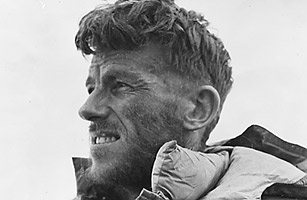
In 1953, Mount Everest was conquered, and the names of an Auckland bee farmer, Edmund Hillary, and his Sherpa climbing partner, Tenzing Norgay, joined those of Peary, Amundsen and Lindbergh atop the hill of 20th century adventuring giants. Of those five, only Hillary is alive; Tenzing died in India in 1986. Sir Edmund, 81, still lives in Auckland, where he resides with his second wife, the former June Mulgrew.
Since summiting on Everest, Sir Edmund has registered numerous other adventuring triumphs in Asia and Antarctica; has served as a diplomat for the New Zealand government; has become a revered figure in Nepal by leading efforts to build dozens of schools and hospitals; has experienced devastating loss when his first wife, Louise Mary Rose, and one of their two daughters died in a plane crash in the Himalayas in 1975; has shared his son Peter's elation when, on his fourth attempt, Peter conquered Everest in 1990; and has — with a certain degree of reluctance — seen his own persona evolve into that of a living legend. If I needed confirmation of Sir Edmund's exalted status not only in the adventuring pantheon but in that of the world itself, it came when my taxi dropped me off in the driveway of the great man's comfortable home on Remuera Road. I reached into my pocket and peeled off a couple of bills to pay the fare. They were New Zealand five-dollar notes, and they bore the mountaineer's picture. I was going to interview New Zealand's Abe Lincoln. Sir Edmund — his friends call him Ed — met me at the door; his wife was out. He is a large, strong man still, larger even than the sinewy climber who scaled the heights. His torso is thick. He has bushy eyebrows and a bushy head of salt-and-pepper hair, as untamed today as it was in all those pictures of him in the wilderness. He looms large, as befits a legend, but he is a gentle man. He invites me in and then, in his sun-soaked living room, gives me all the time I require. He is smart, direct, self-effacing — yet properly proud — just as he was on the occasion of his historic ascent. — Robert SullivanRobert Sullivan: Tell us about your youth.
Sir Edmund Hillary: I was born here in Auckland, but the first 15 years of my life we lived 40 miles south in a small village called Tuakau, and I went to primary school there. My mother was a schoolteacher and very keen that I go to a city school, so although it was fairly impoverished times, I traveled every day to the Auckland Grammar School. I found the city rather trying. I was definitely very much a country boy.
I was a really weedy 11-year-old. I grew five inches one year and six inches the next year, and at the end I was large in size. My relationship with the mountains actually started when I was 16. Every year a group used to be taken from Auckland Grammar down to the Tangariro National Park for a skiing holiday. I think we must have had a good honey season that year, because I was able to persuade my father to let me go on this particular trip. We went down to Ruapehu, and I can remember it just as clearly as when it happened. Our train from Auckland arrived at the National Park station and there was snow everywhere, there was snow on the railroad line, and there was snow on the trees. It was a bright moonlit night, and the moonlight was a brilliant, marvelous sight to me, and it was really the most exciting thing that ever happened to me up to that time — us rushing around skiing. I found I was reasonably energetic and I could rush around and make snowballs, whatever. That was really the start of my enthusiasm for snow and ice and mountains in general. For a few years I skied whenever I could.
Downhill skiing?
Downhill. I enjoyed it immensely, although I never became a great skier. When I was 50 years old, I actually decided to draw up a list of half a dozen things that I really hadn't done very well, and I was going to make efforts to improve. One of them was skiing, and I did become a very much better skier.
What were some of the other things?
Mostly adventurous activities I wanted to do in the Himalayas, in Antarctica. I was successful, actually, on all the projects. Even when you're 50 you can make the effort to improve your standards.
After that trip when you were young, did you know you were going to go in that direction, and become an accomplished outdoorsman?
No, I didn't visualize myself becoming a renowned mountaineer. It happened gradually. I did a lot of hiking in the hills outside Auckland, and then I started modest mountaineering, and then I was able to do harder climbs, and finally I became a reasonably accomplished mountaineer in the New Zealand Alps and I did a number of treks. I'm inclined to think that happens to a lot of people. Very few suddenly decide they're going to be a world champion at something.